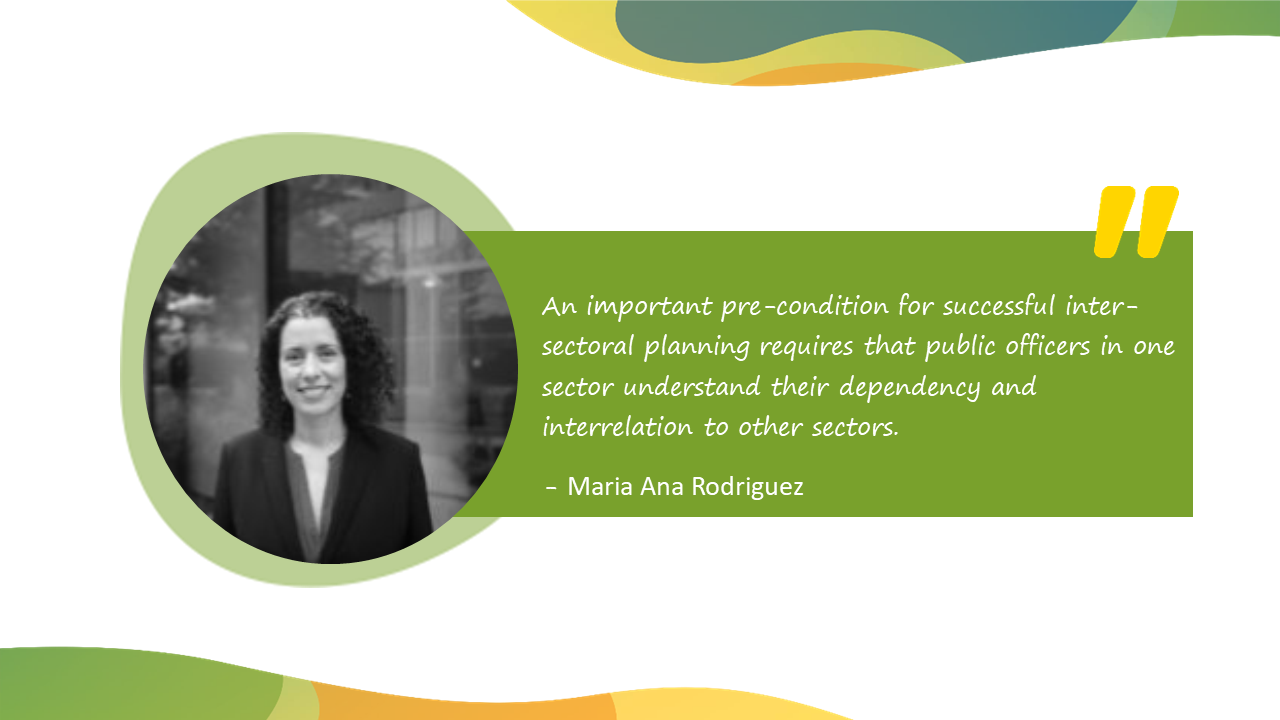Nexus Interview Series // Maria Ana Rodriguez, Head of the Nexus Regional Dialogues Programme
The interview series aims to provide a better picture of the people within the Nexus team and their perspectives on Water Energy Food Nexus challenges and opportunities. In this episode, we invite you to get to know Maria Ana Rodriguez, Head of the Nexus Component.

Maria Ana is the head of the Nexus Component since August 2020. She has vast experience in the water sector, having worked for GIZ in Peru and in the Maghreb countries. Before GIZ, she worked as a consultant for several UN agencies as well as a researcher and lecturer at the Pontifical Catholic University of Peru in Lima. Her areas of expertise entail policy advice, organizational development, capacity development, private-public partnerships as well as project management. She has studied Political Science and Geography at the University of Tübingen in Germany and the University of Texas at Austin in the United States. Maria Ana is based in Eschborn, Germany.

What does the WEF Nexus approach mean to you and how would you describe it in your own words?
Maria Ana: The Water- Energy-Food Nexus approach allows us to look at natural resources management through a magnifying glass. This means that applying such a systemic approach sheds light on the interdependencies between these three sectors: actions in one area can have an effect in one or both areas at the same time. The ongoing drought in Europe makes these interdependencies more tangible than ever; water scarcity affects energy provision through inoperative dams or impacts food production in Italy, Spain and France. At the same time, energy scarcity affects industrial production. A better coordination between these three sectors – as the WEF Nexus calls for- is urgently needed to tackle those dramatic consequences of climate change more effective
In your opinion, what is the main challenge in institutionalising the WEF Nexus from a global perspective?
Maria Ana: The WEF Nexus calls for a paradigm shift in natural resources management, inviting policy makers to go away from silo sectoral planning towards a coordinated inter-sectoral planning. An important pre-condition for successful inter-sectoral planning requires that public officers in one sector understand their dependency and interrelation to other sectors. In this sense, the lack of such knowledge and thinking is a major impediment for WEF Nexus institutionalisation. However, most important is a clear political will and prioritization by hierarchy for applying a systemic approach.
From your perspective, what is the most promising approach to better mainstream and implement the WEF Nexus approach from a global perspective? Following up on the success of the Nexus Regional Dialogues Programme, which activities marked key milestones in your opinion?
Maria Ana: The Nexus Regional Dialogues Programme is looking at different governance levels to better mainstream the WEF Nexus. Our experience has proved that it´s important to apply the approach by demand, this means to build on existing structures and dock at ongoing policy processes. For example, in the Niger Basin, in coordination with the Niger Basin Authority (NBA) and its nine Member States, a Nexus directive on multi-sectoral project development in a transboundary context that will serve project prioritization in the region and anchor the Nexus for strategic planning, is being developed. The directive builds on existing strategies, particularly the NBA Convention, Water Charter and its five annexes and seeks alignment with current planning and financing processes such as the implementation of the current NBA Operational Plan 2016 – 2024 and the development of a regional fund for climate adaptation. Also in Jordan, we are supporting the national government to institutionalize a high-level working group on water and energy by developing a nexus governance framework.
Thank you Maria Ana for taking the time to answer these questions!
More Information on the Nexus Component consisting out of:
- Nexus Regional Dialogues Programme
- FREXUS – Improving security and climate resilience in a fragile context through the Water-Energy-Food Nexus
- Support to the Integrated Management of Water Resources of Lake Kivu and the Ruzizi River
Read more interviews from the series
- Nexus Interview Series // Ludmilla Kiktenko, Regional Coordinator Central Asia
- Nexus Interview Series // Desire Sengoga, Regional Advisor for the support to the integrated management of water resources of lake Kivu and Ruzizi river
- Nexus Interview Series // Kristine Herbomel, Advisor Support to the integrated management of water resources of lake Kivu and Ruzizi river
- Nexus Interview Series // Shamiso Kumbirai, SDG Water Investments Officer at Global Water Partnership Southern Africa
- Interview Series // Introducing the Nexus Dialogue Programme and the People behind it: Irene Sander, Coordinator of the Global Nexus Secretariat
- Nexus Interview Series // Introducing the Nexus Dialogue Programme and the People behind it: Antonio Levy
